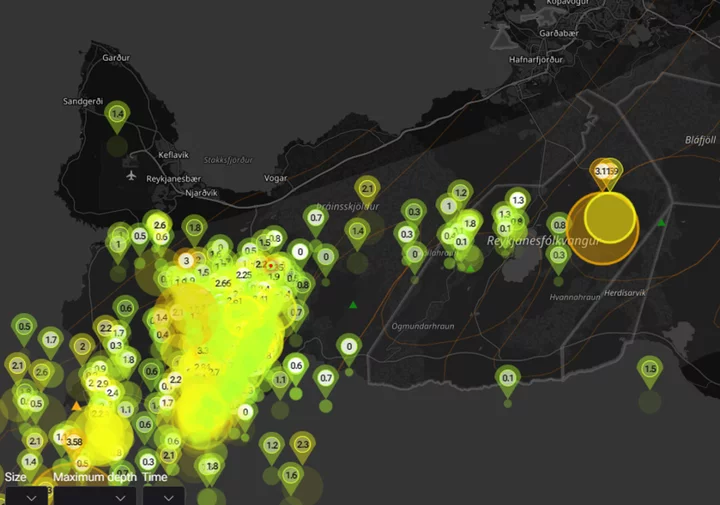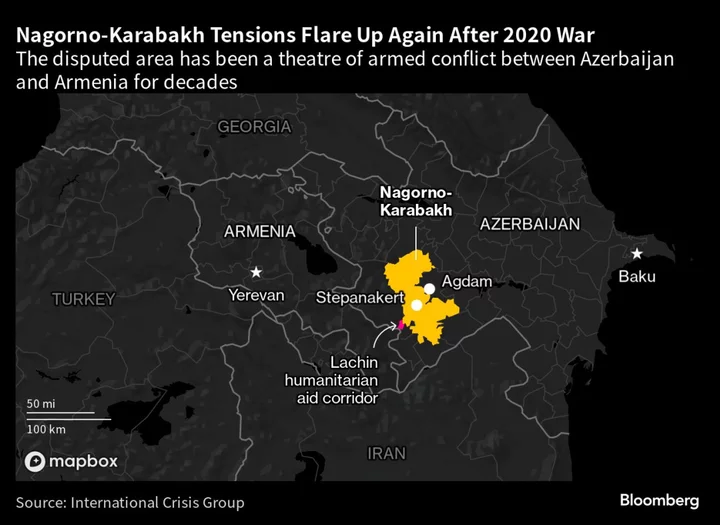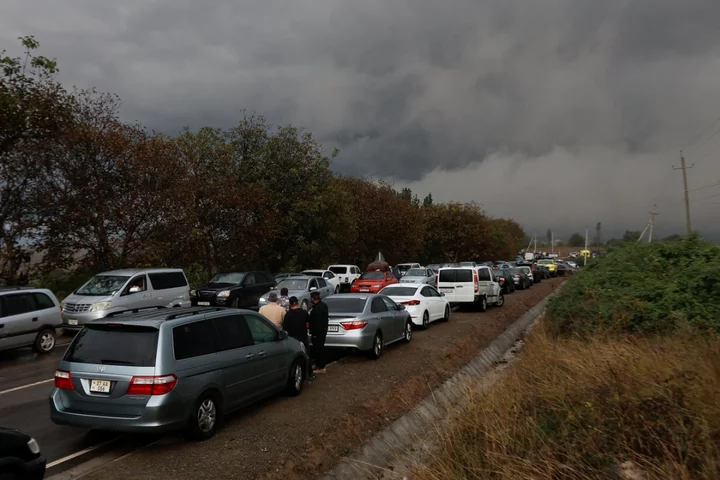Iceland is experiencing a seismic swarm as 1,485 earthquakes have hit the country in just 48 hours prompting fears of a volcanic eruption. Most tremours have been felt in the Reykjanes peninsula in the southwest of the country where small earthquakes have been felt every day for more than two weeks due to a build-up of volcanic magma three miles underground. Thousands have been told to evacuate the town of Grindavik as a precautionary measure as a magma tunnel stretches below the surface. The UK foreign office has updated its travel advice, warning that a volcanic eruption is increasingly likely. Its official warning reads: “Earthquakes and indications of volcanic activity have increased above normal levels on the Reykjanes peninsula, southwest of Reykjavik. “The Icelandic authorities continue to monitor the area closely, particularly the area northwest of Mt Thorbjörn near the Svartsengi power plant and the Blue Lagoon. On 10 November, a Civil Protection Alert was declared after an intense swarm of earthquakes. “The town of Grindavík was evacuated as a precaution. Some roads have been closed and visitors are advised to stay away from the area. “Keflavik International Airport is operating as normal. While there is no current eruption, it is increasingly possible that one could occur. “You should monitor local media for updates and follow the authorities advice on travel to the area.” But it stopped short of advising against travel to the country, where flights from the UK are still running. Airlines and holiday companies are operating trips as normal, which means passengers have no automatic right to cancel their plans. Iceland is highly suceptible to natrual disasters as it lies on the Mid Atlantic Ridge – a divergent plate boundary where the North American Plate and the Eurasian Plate are moving away from each other, leading to volcanic eruptions and earthquakes. Experts are still unclear on the size of the growing volcanic threat. Dr Evgenia Ilyinskaya, an associate professor at the school of earth and environment at the University of Leeds, shared on X, formerly Twitter: “Still much uncertainty about what the scientific data are telling us about the magma intrusion under #Grindavik but the general consensus is that the intrusion is larger than has been seen in recent eruptions.” Read More Mapped: Iceland earthquake locations revealed as volcano eruption alert issued Iceland volcano eruption could be ‘hours or days’, meteorologist warns Iceland evacuates town and raises aviation alert as concerns rise a volcano may erupt Iceland earthquakes: Your rights if you are on holiday there or are planning to go Iceland volcano eruption could happen ‘within hours’ as Grindavik evacuate - live Earthquakes in Iceland prompt fears of volcano eruption
Iceland is experiencing a seismic swarm as 1,485 earthquakes have hit the country in just 48 hours prompting fears of a volcanic eruption.
Most tremours have been felt in the Reykjanes peninsula in the southwest of the country where small earthquakes have been felt every day for more than two weeks due to a build-up of volcanic magma three miles underground.
Thousands have been told to evacuate the town of Grindavik as a precautionary measure as a magma tunnel stretches below the surface.
The UK foreign office has updated its travel advice, warning that a volcanic eruption is increasingly likely.
Its official warning reads: “Earthquakes and indications of volcanic activity have increased above normal levels on the Reykjanes peninsula, southwest of Reykjavik.
“The Icelandic authorities continue to monitor the area closely, particularly the area northwest of Mt Thorbjörn near the Svartsengi power plant and the Blue Lagoon. On 10 November, a Civil Protection Alert was declared after an intense swarm of earthquakes.
“The town of Grindavík was evacuated as a precaution. Some roads have been closed and visitors are advised to stay away from the area.
“Keflavik International Airport is operating as normal. While there is no current eruption, it is increasingly possible that one could occur.
“You should monitor local media for updates and follow the authorities advice on travel to the area.”
But it stopped short of advising against travel to the country, where flights from the UK are still running.
Airlines and holiday companies are operating trips as normal, which means passengers have no automatic right to cancel their plans.
Iceland is highly suceptible to natrual disasters as it lies on the Mid Atlantic Ridge – a divergent plate boundary where the North American Plate and the Eurasian Plate are moving away from each other, leading to volcanic eruptions and earthquakes.
Experts are still unclear on the size of the growing volcanic threat.
Dr Evgenia Ilyinskaya, an associate professor at the school of earth and environment at the University of Leeds, shared on X, formerly Twitter: “Still much uncertainty about what the scientific data are telling us about the magma intrusion under #Grindavik but the general consensus is that the intrusion is larger than has been seen in recent eruptions.”
Read More
Mapped: Iceland earthquake locations revealed as volcano eruption alert issued
Iceland volcano eruption could be ‘hours or days’, meteorologist warns
Iceland evacuates town and raises aviation alert as concerns rise a volcano may erupt
Iceland earthquakes: Your rights if you are on holiday there or are planning to go
Iceland volcano eruption could happen ‘within hours’ as Grindavik evacuate - live
Earthquakes in Iceland prompt fears of volcano eruption









